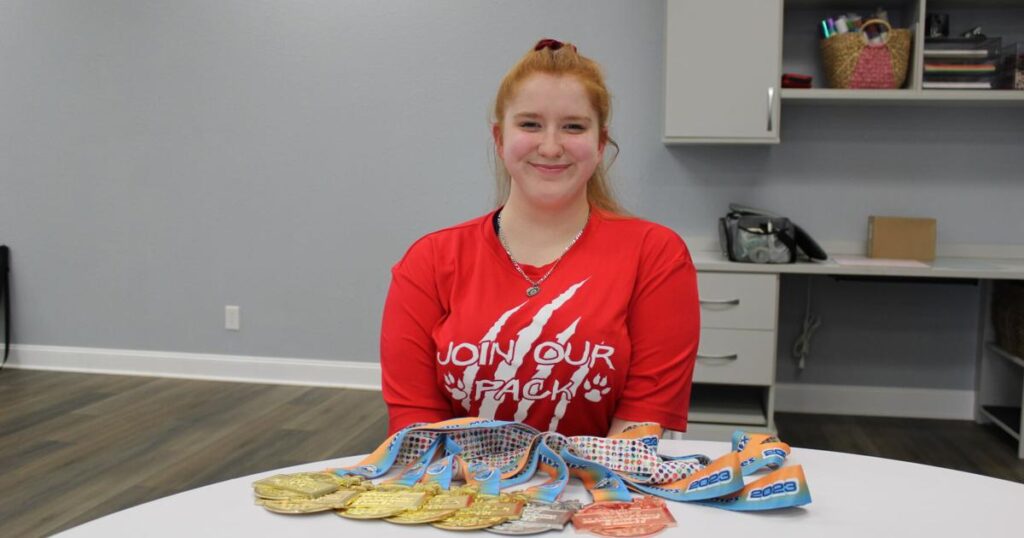SPRING HILL — In some ways, Emma Dillon is a typical 17-year-old, but when she puts a pile of medals around her neck, she becomes a different person.
Martial arts champion.
She's also on the autism spectrum, and like her martial arts skills, it's taken years of hard work from her and her mother, Melonie, to make her special needs almost imperceptible.
As she was introduced to the press, she spoke freely and enthusiastically about her progress with Dillon's Martial Arts and the International Sport for All Association (TAFISA), where she won enough medals at the TAFISA World Martial Arts Games to make travelling through the airport a challenge: five gold medals, one silver and one bronze.
“The reason I became a world champion is because I won a lot of gold medals,” she said.
Emma happily posed for photos in various poses with her medal, before posing with her mother Melonie and 24-year-old brother Ethan.
“I'm autistic,” Emma says, “I was diagnosed with moderate to severe autism when I was two years old. I've been to speech therapy and physical therapy my whole life. I've tried so hard to hide and camouflage myself, to blend in. What you see here is a mask.”
Ethan Dillon said while only certain types of martial arts are allowed in the Olympics, TAFISA matches try to show greater diversity.
“The idea was to show that we could all train and compete together under a wide range of rules,” he said.
“It was an amazing experience,” Emma said of the competition. “It was much more than I expected. I had a lot of fun and I'm happy I got to represent my country for what I believe in.”
Storefront Dojo
At the dojo in a shopping centre in Spring Hill, where teacher Ethan Dillon teaches, Emma has been trying for years to catch up with her brother.
At the 2023 World Martial Arts Championships held in Daytona Beach, people from all over the world came together to compete in kata, sparring and jiu-jitsu competitions based on gender and weight class.
“Kata” is a well-worn fighting scene, Emma said.
“In Japan, ordinary people didn't need to learn martial arts,” she says. “They learned martial arts so they knew how to defend themselves.”
Emma's mother, Melony, had to raise and educate her at home, and her first trip to the cinema was a shock to her – today, there are special films shown for people with neurodevelopmental disorders.
“I'm incredibly proud of my daughter. When she was first diagnosed she completely lost her ability to speak,” Melonie Dillon said. “She started running at nine months old and has since lost a lot of that ability. She's way behind other kids her age.”
“I thought, 'What should I do?'
She home-schooled Emma.
Melonie's main thought was: “You're not disabled, you just need extra help.”
“I was the only one from the Florida team who competed in the special needs division,” Emma said, adding that Melonie also competed against “neurologically normal” people.
“I call them 'regular people,'” Emma said.
Ethan said he has taught people who need help. He has taught the blind, the deaf, people in wheelchairs. He has seen children stranded on the side of the road and now he knows how to teach them.
He added that he was taught by a blind person.
“You never think about what it's like to be blind until you decide, 'Right, let me put myself in your shoes,' and try wearing a blindfold for a week, so you can understand how you function.”
Emma herself prefers the term “special needs.”
“I hate when people call us disabled. That's the only term I hate,” she said. “I'm not disabled.”
Emma knows what she wants to do next.
“Maybe I'll go back and beat the hell out of those foreigners,” Melony said.
Emma does much more than that.
“I want to make a change so that people don't treat special needs differently,” she said. “I have deep empathy for special needs. I know what they've been through, I know what they're thinking. I know a lot of their struggles because I've been through them myself.”
“And I know they're listening to what people are saying about them. They might not be able to put it into words, but they're listening.”
“And I don't want to see that anymore. I want people to see us as equal human beings.”

